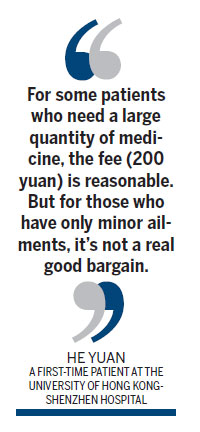Trademark power
Updated: 2014-10-31 07:28
By Zhou Mo(China Daily USA)
|
|||||||||
|
The main entrance to the University of Hong Kong-Shenzhen Hospital in Futian district. |
|
The University of Hong Kong-Shenzhen Hospital stands out from other government-funded ones with a Hong Kong-oriented management mode. |

Despite early operational hitches, Hong Kong-run hospitals in Shenzhen remain a hit with mainland patients who relish the environment and services offered by the institutions. Zhou Mo reports
When the University of Hong Kong-Shenzhen Hospital threw open its doors across the border two years ago, it was deeply applauded by Shenzheners who have nurtured a special big appetite for "anything Hong Kong-style".
But since its opening in 2012, the hospital has not found favor with media reports, showered with unflattering headlines twice within a month. In July this year, it was reported that the hospital - fully funded by the Shenzhen municipal government - had sunk into the red with a HK$1 billion ($129 million) deficit. A month later, it again came under the spotlight when it decided to slap a 50-percent hike on its outpatient fees - from 130 yuan to 200 yuan ($33) per person, with effect from September 1 this year.
The hospital, located in Futian district and jointly founded by the Shenzhen government and the University of Hong Kong, stands out from other government-funded ones with a Hong Kong-oriented management mode. It adopts a "generalist first, specialist next" triage system - first-time patients will be initially diverted to general practitioners, but will be referred to specialists if necessary. An inclusive price system is also adopted, covering registration, diagnosis and consultation, and medicine fees (for a maximum seven days), basic inspections and non-serious wound treatment.
Recognition won
The system, aimed at boosting efficiency, won recognition from medical officials. "It effectively avoids over-treatment and ensures sufficient time for communication between patients and doctors, guaranteeing the quality of medical service," says Luo Lexuan, director of the Public Hospital Administration of Shenzhen.
Some people, however, have mixed views, arguing that general practice only suits certain patients. "For those who don't know well about their illnesses, general practice is an ideal method as physicians can help figure out what their problems are," said He Yuan, a first-time patient at the hospital. "But for those who know exactly what they are suffering from, the mode seems unnecessary and the 200-yuan fee is a waste."
The price hike had long been expected as the hospital had twice applied to reset its general practice fee at 200 yuan per person. The requests were submitted to the Shenzhen government before its opening and in a report a year later.
Deng Huiqiong, head of the University of Hong Kong-Shenzhen Hospital, admitted that the previous 130-yuan charge had failed to cover the institution's mounting operating expenses. But, it was not until this summer that the Shenzhen authorities finally approved the hospital's application following a bleak consulting report by global accountancy giant PricewaterhouseCoopers that the hospital was in dire straits. The report warned that if the hospital failed to improve services through reform, its deficit could spiral upwards to HK$4.8 billion within a decade, making its operations unsustainable.
A balanced budget
However, the Public Hospital Administration of Shenzhen immediately dismissed the report, countering that the hospital had achieved a balance of payment in 2013. As a public hospital and a non-profit medical institution, the University of Hong Kong-Shenzhen Hospital has a balanced budget, the administration argued, explaining that all its expenses are covered in financial budget management system.
"Regarding the hospital's finances, please refer to the statement by the Public Hospital Administration of Shenzhen," Deng said in an e-mail response to China Daily.
The price hike has not deterred patients like He Yuan. He, who lives far away from the hospital and was suffering from severe fever, still chose to have treatment there. As a Shenzhen resident with local medical insurance, she said the size of the medical fee was not on her mind when she decided to seek treatment at the hospital.
What she cared most is the environment it offers. "Since I'm already very sick, I don't want to step into a narrow and noisy hall crowded with patients groaning in pain. That would make me even sicker," He said.
But, for those without local medical insurance, the 200-yuan fee is unavoidable. "Patients may see the fees in a different light, depending on what their sickness is. But, generally, 200 yuan is not high," a senior employee at a Shenzhen public hospital said.
"At the University of Hong Kong-Shenzhen Hospital, doctors spend 20 minutes on each patient, compared with only a few minutes at public hospitals. It's much higher in terms of labor value," he said.
In He's view, it's hard to gauge the rationality of the price hike. "For some patients who need a large quantity of medicine, the fee is reasonable. But for those who have only minor ailments, it's not a real good bargain," she reckoned.
She said the price increase would not influence her mentality to a great extent. "Even if I have no Shenzhen medical insurance, I would still seek treatment at the hospital. There's no reason for me to shut the hospital out just because it raised its fees."
Contact the writer at sally@chinadailyhk.com
(China Daily USA 10/31/2014 page7)
Most Viewed
Editor's Picks

|

|

|

|

|

|
Today's Top News
Consensus sought with US on governance of Internet
US experts hope China joins trade partnership
WB report ranks China on business-friendly rules
China to join pro football wars
Halloween haunts China as popularity grows
Mixed bag for China as US Fed ends QE stimulus
Apple's Tim Cook says 'proud to be gay'
Conference conducive to building consensus on Afghanistan
US Weekly

|

|


















